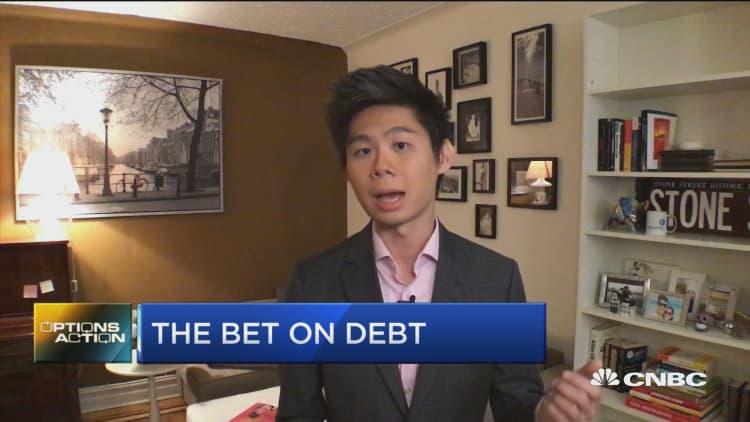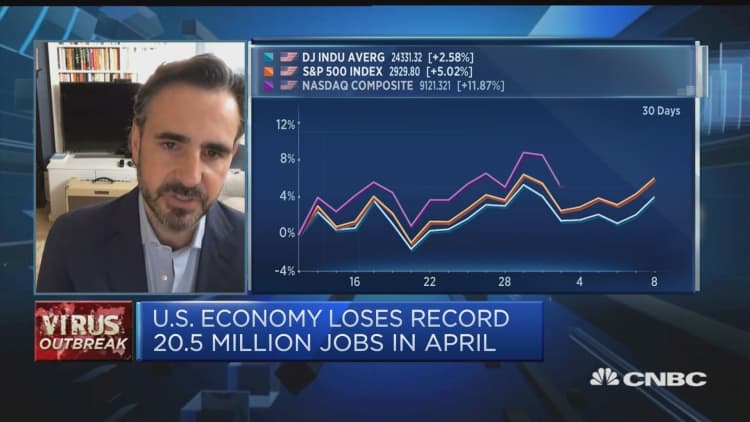The price action of high-yield corporate bonds will signal to investors when the bear market triggered by the coronavirus pandemic is truly at its bottom, according to Longview Economics.
A bear market is a broad decline in a stock market, often defined as a price decline of 20% from a recent high. Sudden, sharp losses in stocks in early-to-mid-March took global stocks into bear market territory as the coronavirus pandemic spread worldwide and oil prices plummeted.
Stock markets have rallied in recent days, however, fueled by unprecedented monetary and fiscal stimulus from central banks and governments around the world, and the commencement of efforts to reopen economies following prolonged lockdowns. Markets have shrugged off dire economic indicators, such as the U.S. shedding a record 20.5 million jobs in April, suggesting that investors are beginning to see a case for a V-shaped recovery.
However, Longview economists believe this is too optimistic, in terms of the outlook for both earnings and GDP (gross domestic product). They expect the "current pandemic induced supply side shock to evolve into a demand side shock" in a more traditional recession.
Relief rally, not a bull market
In a note Monday, Longview argued that high-yield corporate bond spreads have signaled the end of every cyclical bear market since they started being recorded in 1997, often peaking before the equity bear market low.
Credit spreads are the difference between the yields on a particular corporate bond and a government bond.
"On this occasion, credit spreads are not confirming the end of the bear market. Over the last 6 - 7 weeks, the S&P 500 has rallied 34% from its intraday lows. Credit spreads, though, are little changed (tightening from 19.4pp (percentage points) to 17.6pp)," the note said.
"That type of muted price action in credit is normal during equity market relief rallies within a bear market."

As a bear market nears its end, credit spreads narrow aggressively as the equity markets rally, Longview economists said. Within seven weeks of the end of the bear market that originated during the global financial crisis in 2008, spreads tightened by more than 10 percentage points, they flagged.
The behavior of spreads was similar in during the bear markets of 2002 and 2016, but the current muted price action of U.S. high-yield bonds rated CCC or lower is not signaling the start of a bull market, Longview economists argued. A CCC rating indicates a "junk" bond that is considered particularly high risk, and so is high yield.
"This message is consistent with the behavior of US 10 year bond yields, which remain stuck near their lows," the note added.
The message, Longview economists hypothesized, is one of caution that bankruptcies are inevitable and policy is not yet sufficient to bring the bear market to a close. The current market action signals a relief rally, and not the start of a V-shaped recovery, they concluded.
Remove stimulus at your peril
This was echoed by M&G Investments Macro Fund Manager Eric Lonergan, who told CNBC Monday that a key risk to any recovery would arise if stimulus measures were rolled back too soon.
"The reality is we are going to need stimulus after lockdown is removed, and I fear that there is a belief out there that once we lift lockdown, we can start unwinding support," Lonergan told CNBC's "Squawk Box Europe."
He suggested that economies are not going to return to 100% capacity for some time and will instead return to at-best around 90-95%, which still represents a "severe recession in the context of history."

Lonergan argued that the subtle message in markets was that the cyclical sectors have not recovered with any great momentum.
"If you look at U.S. banks, which are probably the cyclical indicator, or 10-year Treasuries over the last five weeks, they haven't shifted very much," he said.
Instead, markets have been driven by investors seeing "some winners" in the tech sector, and have been "very discriminating" since liquidity concerns sparked the initial mass sell-off in March, Lonergan concluded.

